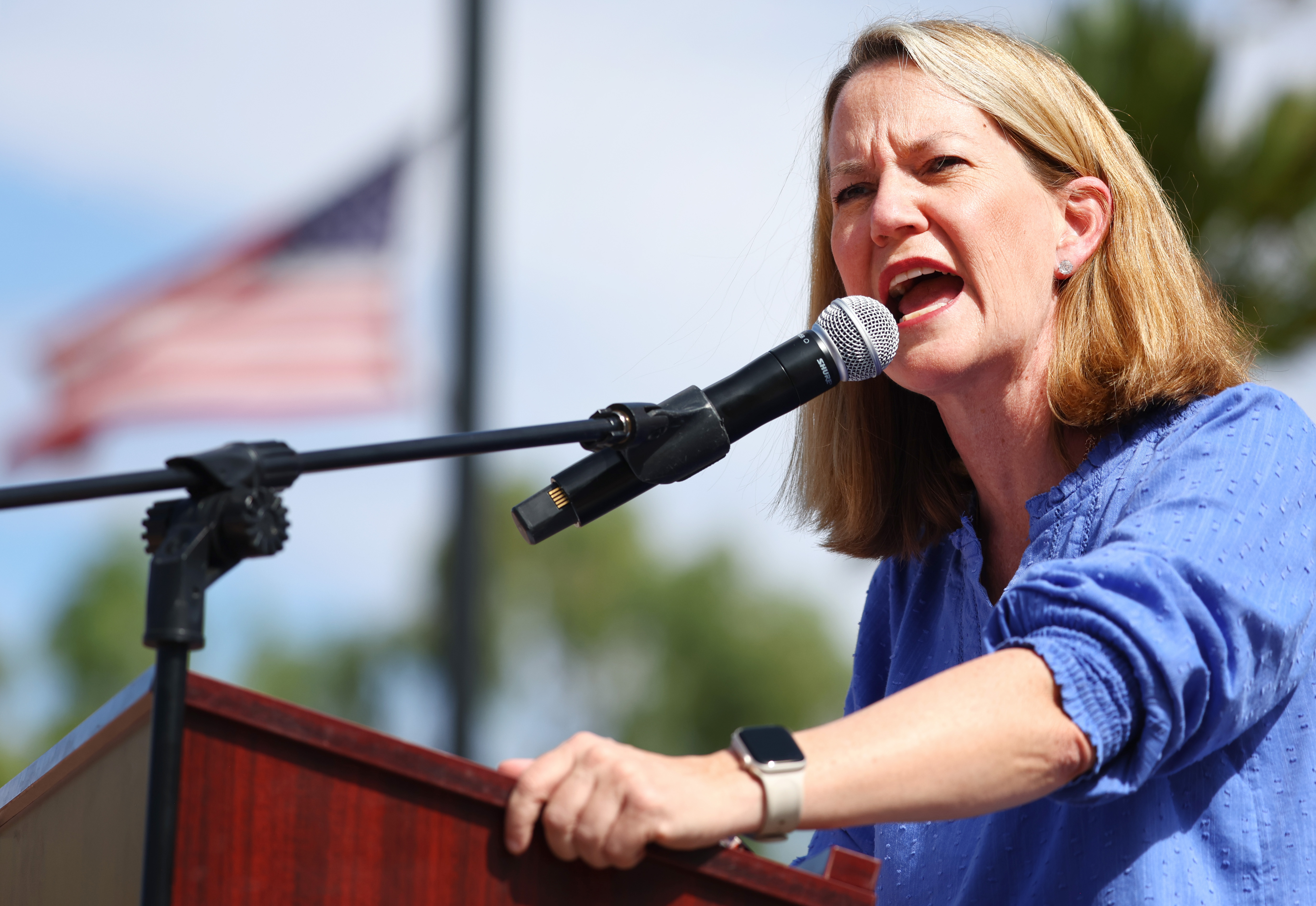Donald Trump tried to assure skittish GOP lawmakers Thursday that they all share the same Republican Party goals, but his first appearance before the rank-and-file failed to soothe some deep concerns about his undisciplined campaign.
Protesters chanted in sweltering heat outside, while inside a packed room at the Republican National Committee, Trump offered a simple message, according to Rep. Ken Calvert of California: "We all need to stick together. Things will all work out in November."
With GOP lawmakers unanimous in their desire to beat Hillary Clinton this fall, some welcomed the reassurance and applauded Trump's remarks. It wasn't enough for others, as lawmakers who have been wary of Trump's incendiary comments and off-putting campaign style said they remain unconvinced.
"I said before the meeting that Donald Trump has a lot of work to persuade many Americans, including myself, that he is able to lead this great country," said Rep. Charlie Dent, R-Pa. "I still need to be persuaded."
Trump's appearance came on a circuslike day on Capitol Hill, with FBI Director James Comey testifying to a House committee about Clinton's email practices, summoned by Republican lawmakers furious about his decision, announced Tuesday, that Clinton should not face criminal charges.
Dozens of protesters awaited Trump, shouting slogans and waving signs that said Trump is "Dangerous, Divisive, Deceitful." Protesters chanted, "Donald Trump, he's a fraud. Sending our jobs far abroad." They held up large photos of GOP lawmakers, including vulnerable senators, wearing Trump campaign hats, as the billionaire arrived with daughter Ivanka and son-in-law Jared Kushner.
Trump defended himself against some of his harshest Senate critics. Addressing Nebraska GOP Sen. Ben Sasse, he said, "Surely, you don't want Clinton." Sasse, in a statement from his office, referred to the two presidential choices as a "Dumpster fire," adding that "nothing has changed."
U.S. & World
Rep. Adam Kinzinger of Illinois, an outspoken Trump critic, said there was a lack of energy in the room. "You could feel it," he said.
"I'm not a Never Trump guy, I've said I want to get there. I'm a Republican and I want to support the nominee," Kinzinger said after leaving the meeting early. "But things like the Saddam Hussein comment are not helping me get there," Kinzinger added.
He was referring to Trump having praised the late Iraqi dictator's terrorist-killing prowess. Trump defended himself over those comments Thursday, telling lawmakers it was an example of the media twisting his words, according to Rep. Kevin Cramer of North Dakota, a strong Trump supporter.
Cramer paraphrased what Trump said: "Here I was very critical of Saddam Hussein, saying he's a very, very bad guy, evil guy. And I wake up and I look at the media and they say I love Saddam Hussein."
House Speaker Paul Ryan said Trump sought to put the Saddam comment "into context, so people understood the context in which he was speaking about getting tough on terrorism."
Trump offered some what they wanted to hear. He talked of repealing President Barack Obama's health law, reducing regulatory burdens, overhauling tax laws and getting the Supreme Court to "be one that is more reflective of the values of the country," according to Rep. Tom Price, R-Ga.
Trump delivered a "great unifying speech," Price said, and his listeners were "very receptive."
Ryan told reporters later, "We clearly have a presumptive nominee who wants to work with us on moving this agenda forward."
But others sounded unimpressed though resigned to backing the likely GOP nominee.
Republicans pressed Trump on whether he would defend Article 1 of the Constitution on the separation of powers; Trump said he would defend "1, 2, 3 to 12," said South Carolina Rep. Mark Sanford. In fact, there are only seven articles.
"I wasn't particularly impressed, I think it was the normal stream of consciousness that's long on hyperbole and short on facts," said South Carolina Rep. Mark Sanford, who dismissed the alternative — Clinton.
The gatherings came less than two weeks before the GOP's national convention, which a number of leading Republicans, including some in Congress, are skipping.
It came on the heels of a fiery Trump speech Wednesday night in which he defended his retweet of the image of a six-pointed star alongside a picture of Clinton on a field of hundred-dollar bills. Many saw the symbol as a Star of David and considered the image to be anti-Semitic, and Ryan and others criticized the retweet. Instead of focusing on Clinton during his remarks Wednesday in Cincinnati, as Republican leaders would have liked, Trump mixed his attacks on the presumptive Democratic nominee with a defense of the tweet as well as earlier remarks complimenting Saddam. Trump argues the star in his tweet was a regular star that a sheriff might use.
Democrats sough to capitalize on Trump's appearance on the Hill. The Democratic Congressional Campaign Committee released a pair of ads linking Republican lawmakers to Trump.



